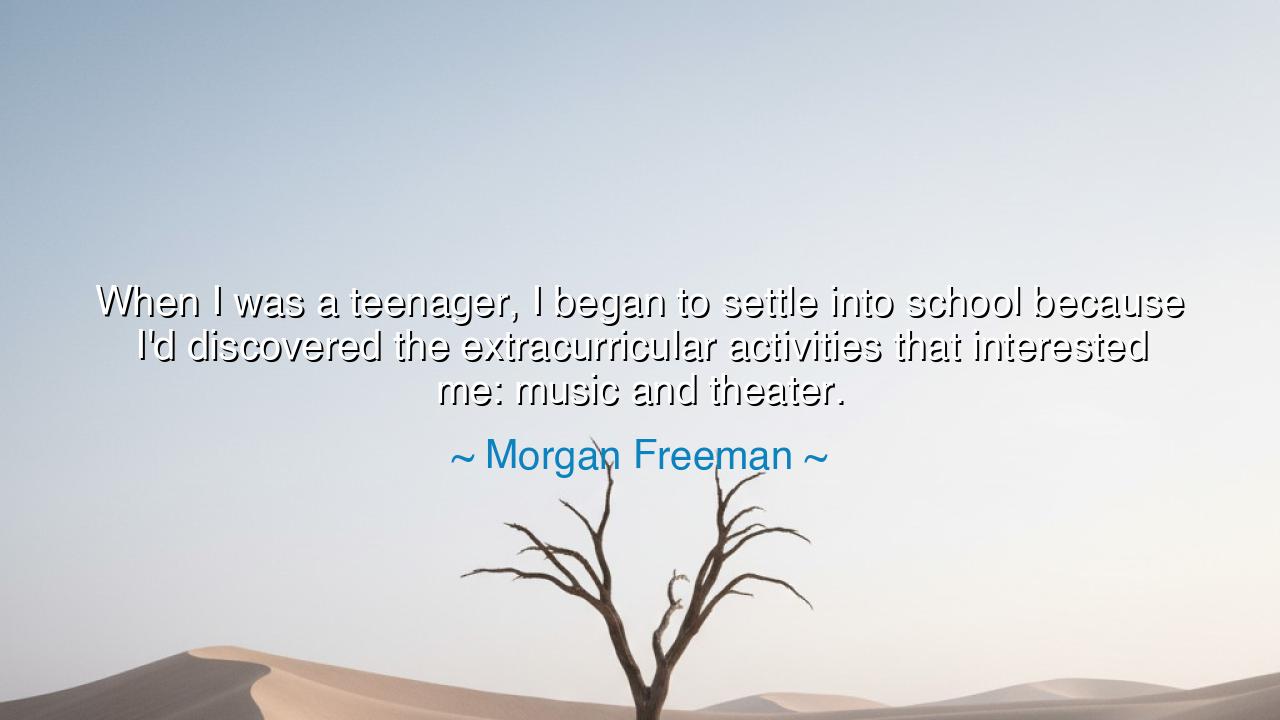
When I was a teenager, I began to settle into school because I'd
When I was a teenager, I began to settle into school because I'd discovered the extracurricular activities that interested me: music and theater.






Hear the words of Morgan Freeman, who spoke with humility of his youth: “When I was a teenager, I began to settle into school because I’d discovered the extracurricular activities that interested me: music and theater.” These words, though gentle, bear the weight of a great truth: that the restless soul finds its peace not in mere duty, but in discovering what stirs its passion. It is not the rigid walls of obligation that shape the spirit, but the discovery of pursuits that awaken the heart and give direction to one’s energy.
To be a teenager is to stand at the threshold of becoming, full of storm and confusion, longing for meaning, yet often trapped in structures that feel lifeless. Many drift through such years, burdened by tasks that do not call to their true nature. Freeman himself confessed to this wandering spirit until he found music and theater, those radiant torches that lit his way. In their embrace, the routine of school transformed; no longer was it a prison of lessons, but a place of discovery, where he could cultivate the seeds of his future greatness.
This truth has echoed through history. Consider the young Leonardo da Vinci, who as a boy cared little for the rigid structures of traditional study. Yet when he placed brush to canvas, or chisel to stone, his spirit blazed with joy. It was not Latin grammar that shaped him into a genius, but the discovery of his extracurricular passions—art, mechanics, design—that transformed him from a wandering boy into one of the greatest minds of all time. So too does Freeman remind us that true growth begins when we find the pursuits that call to the soul.
The meaning of this quote also reveals a great paradox: discipline is born not from force but from desire. When one discovers an activity that stirs the heart, even labor becomes joy, and persistence flows naturally. Freeman settled into school not because he was commanded, but because he had found something within it worth striving for. This is a lesson to all: if you wish to endure hardship, find within it a spark of love. Without that spark, effort withers; with it, even struggle becomes sacred.
Moreover, Freeman’s choice of music and theater speaks to the power of the arts. These are not idle diversions, but disciplines that shape empathy, imagination, and presence. Through music, the heart learns harmony; through theater, the soul learns to embody the lives of others, to walk in their joys and sorrows. It is no wonder that Freeman, who found his path in these arts, became not only an actor but a voice of wisdom for generations. His discovery in youth was not trivial—it was destiny revealed in the form of play.
The lesson we must carry is clear: do not ignore the call of passion, even if it lies outside the path that seems most practical. Extracurricular activities—be they arts, sports, crafts, or causes—are not distractions, but the hidden doorways to purpose. They are where the heart first meets itself, where the spirit finds its voice. To suppress them is to dim the flame; to embrace them is to invite destiny.
So take this wisdom into your own life. Encourage the young not only to complete their duties, but to seek the activities that stir their joy. As adults, do not abandon your own passions, for they are not luxuries but lifelines. Seek out music, or writing, or the theater of life itself—anything that awakens your being. In these, you will find the energy to endure the burdens of the day and the clarity to pursue a greater purpose.
Thus speaks the spirit of Freeman’s words: that the soul finds peace not in obedience alone, but in discovering the pursuits that awaken its fire. Nurture these fires, and your life will not only be endured—it will be lived.






AAdministratorAdministrator
Welcome, honored guests. Please leave a comment, we will respond soon